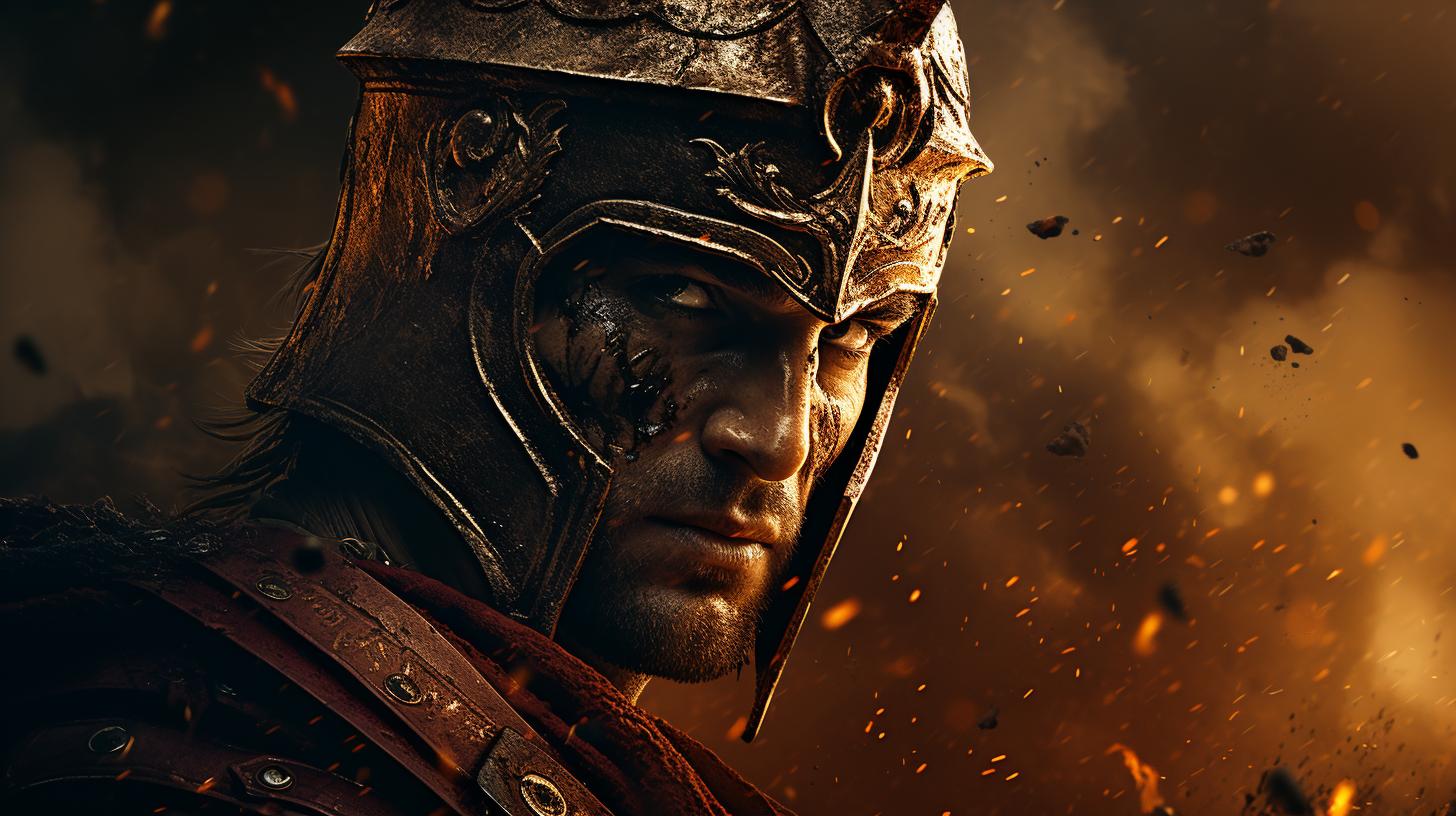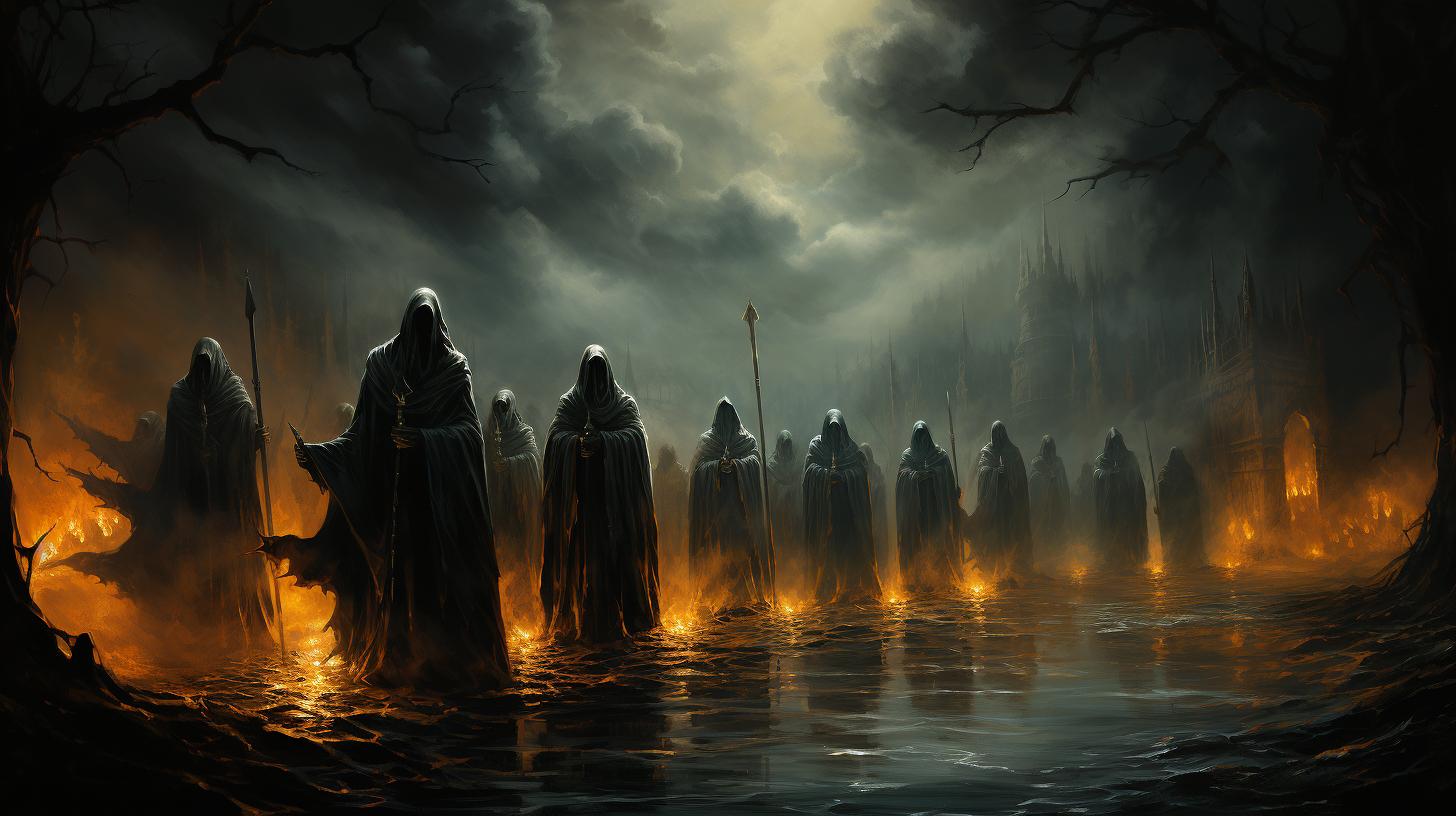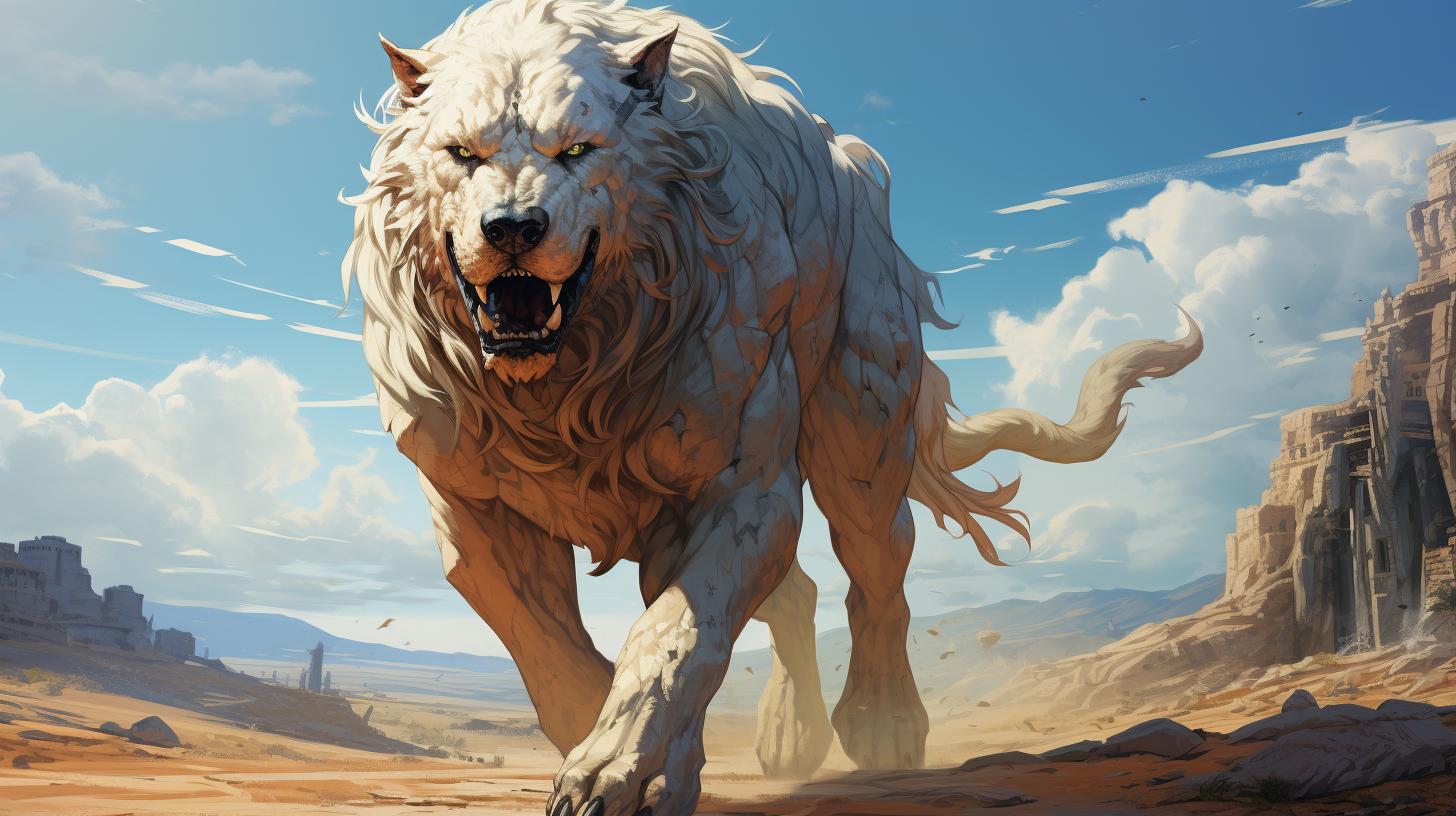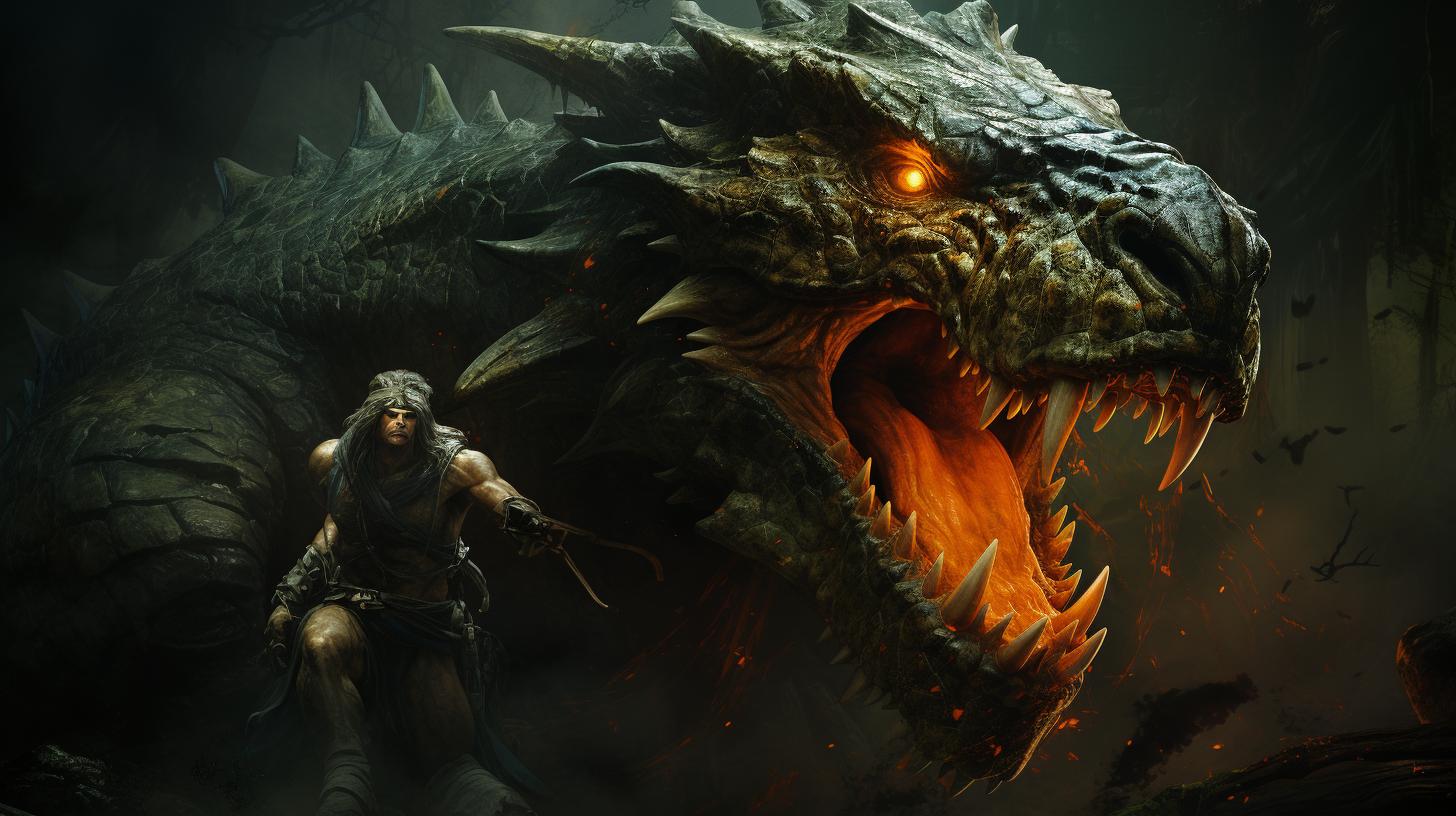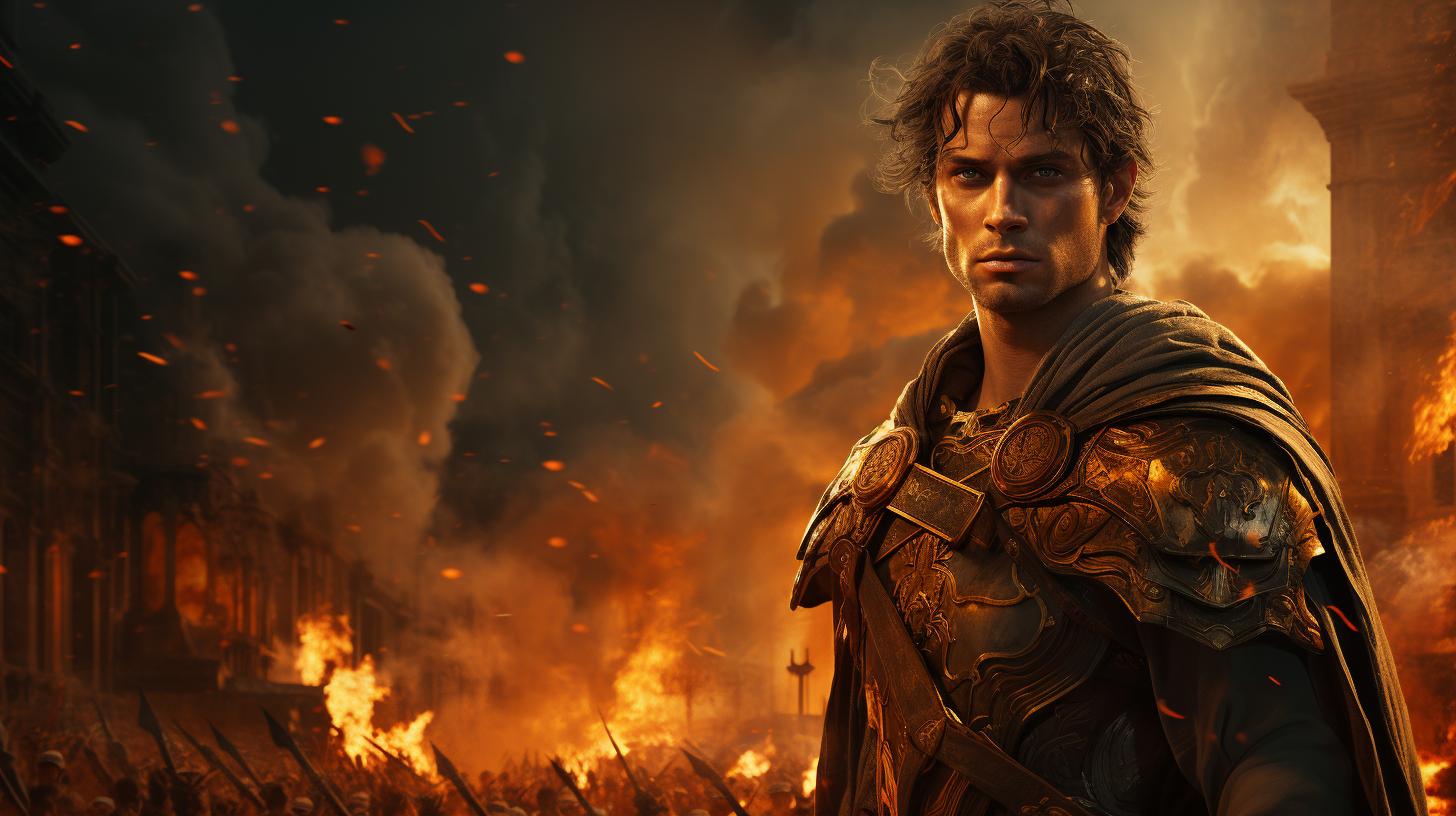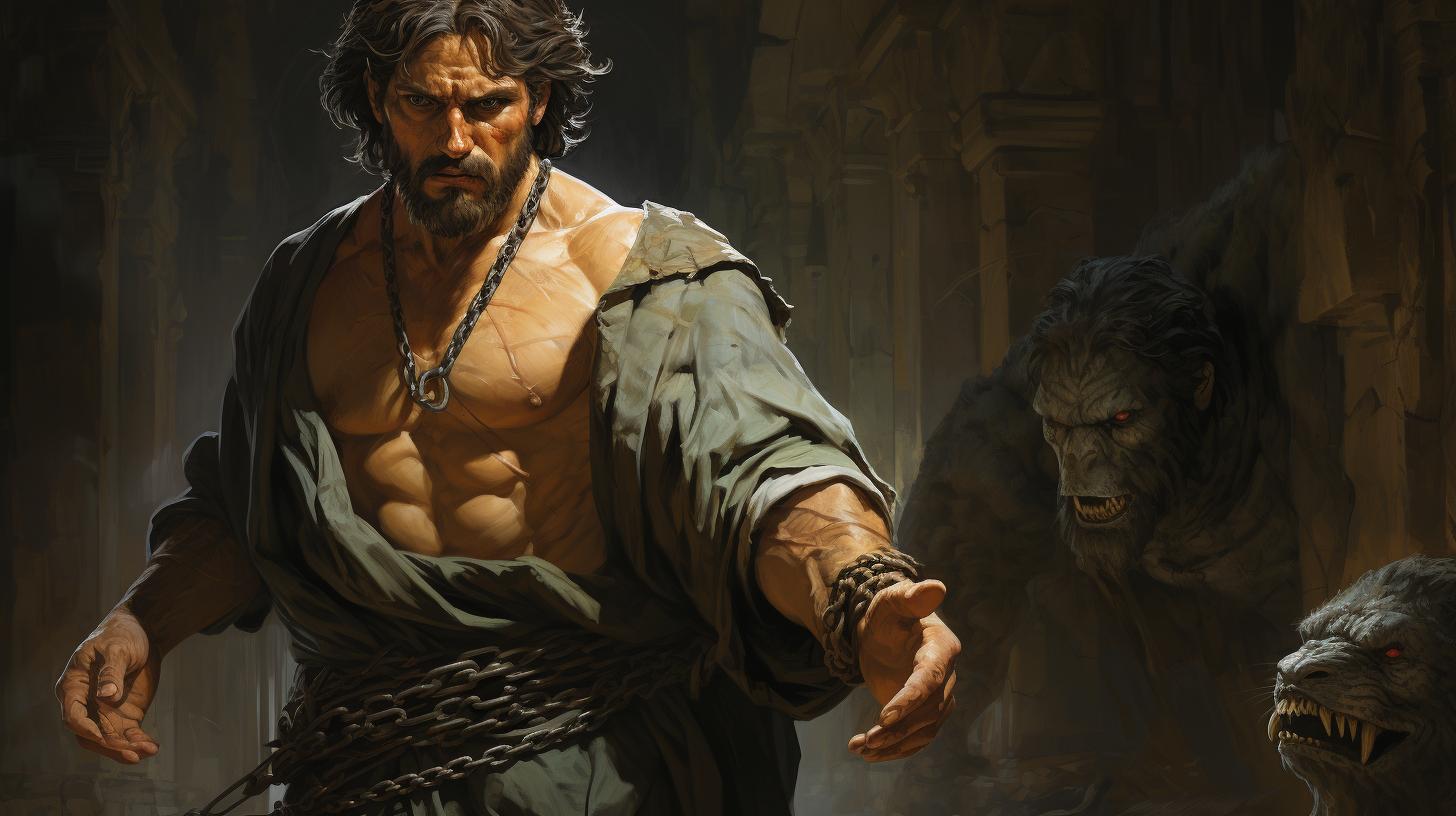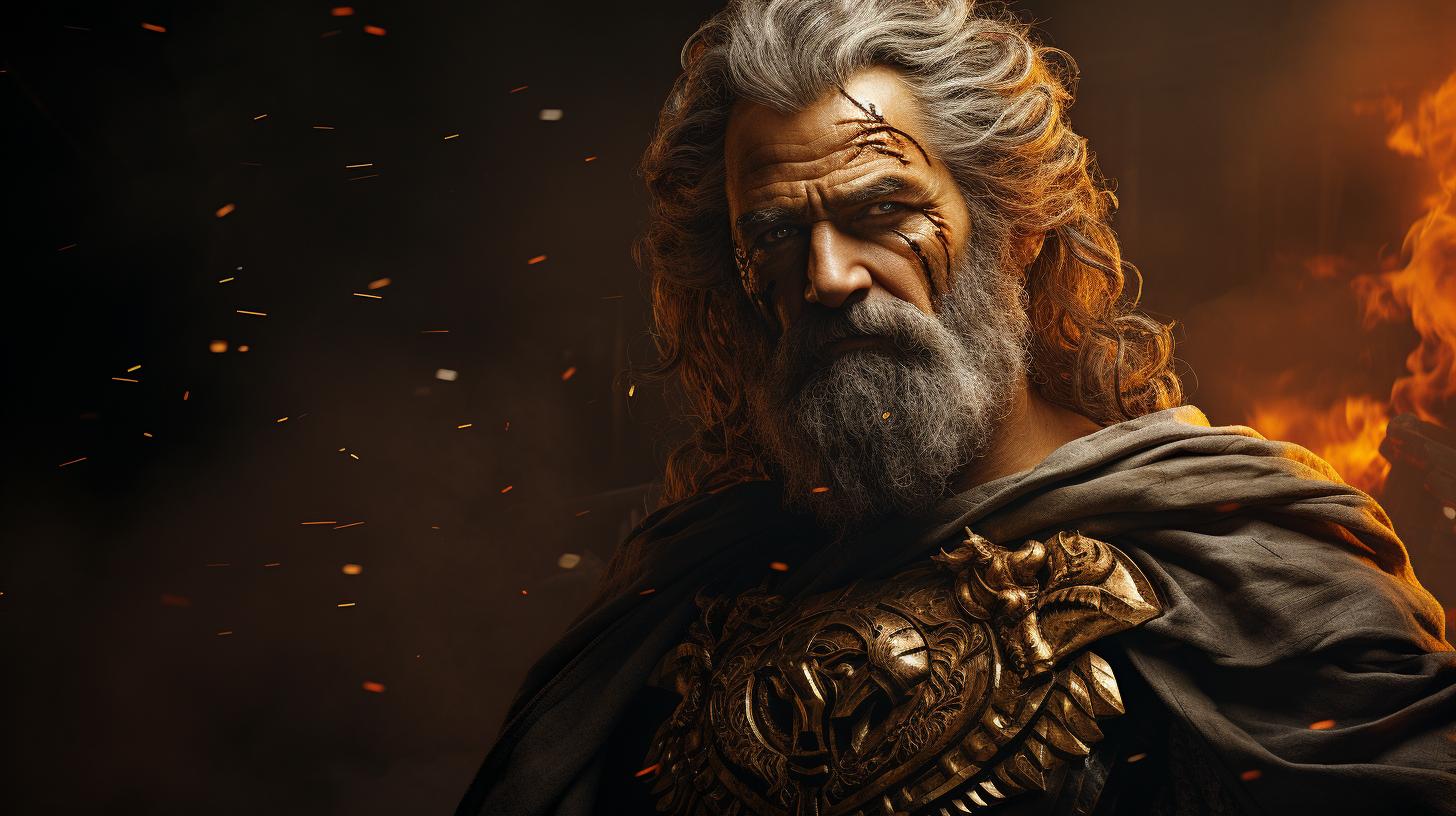The Legendary Tale of Achilles in Greek Mythology
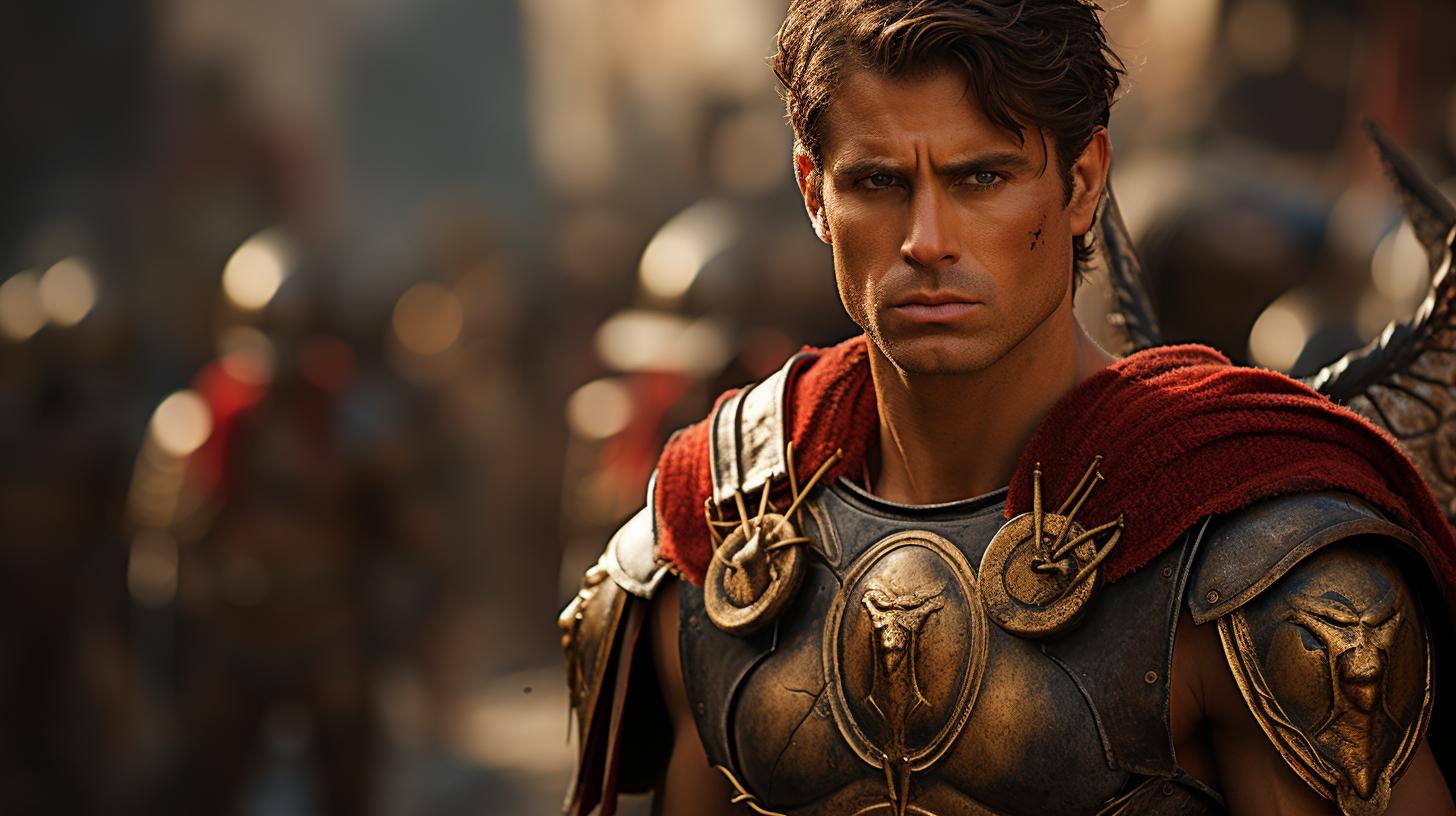
Achilles, the legendary hero of Greek mythology, captivates us with his extraordinary abilities and tragic fate. Born to Peleo, the king of the Myrmidons, and Thetis, a Nereid, Achilles was known for his invulnerable body, except for his heel.
Throughout the epic Trojan War, he played a pivotal role, fuelled by his strong bond with Patroclus. Achilles’ wrath against Agamemnon and his epic clash with Hector showcased his valor and vengeance.
This article explores the captivating story of Achilles, his enduring legacy, and his cultural significance in the United States.
Achilles: The Hero of Greek Mythology
Achilles, the legendary hero of Greek mythology, stands as one of the most revered and celebrated figures in ancient tales. Known for his extraordinary strength, courageous deeds, and tragic fate, Achilles embodies the essence of heroism in Greek culture.
He is a symbol of invincibility, bravery, and the pursuit of glory.
Born as the son of Peleo, the king of the Mirmidones, and Tetis, a Nereid, Achilles possessed remarkable abilities from birth.
His exceptional physical prowess, unmatched by any mortal, made him a force to be reckoned with on the battlefield.
Achilles’ heroism and valor were witnessed during the Trojan War, a monumental conflict between the Greeks and the Trojans.
In this epic clash, Achilles played a pivotal role, leading the Greek forces to numerous victories. His fame and reputation grew as he faced formidable enemies and displayed unparalleled bravery.
One of the defining characteristics of Achilles was his invincibility, which stemmed from being dipped in the River Styx by his mother, except for the heel by which she held him.
This vulnerability in his heel would ultimately lead to his downfall. It was this fatal weakness that Paris, a Trojan prince, exploited, resulting in Achilles’ tragic demise.
The story of Achilles not only captivates with its thrilling battles and heroic feats but also explores complex themes such as friendship, loyalty, and the cost of greatness.
His unwavering bond with Patroclus, his closest companion, adds depth to his character and showcases the importance of human connections in times of war and strife.
Achilles’ heroic journey continues to resonate in modern times, inspiring countless works of literature, art, and adaptations.
His legend lives on as a symbol of heroism and the timeless pursuit of glory. The story of Achilles is a testament to the enduring power and influence of Greek mythology in shaping our cultural imagination.
Origins of Achilles: Son of Peleo and Tetis
In Greek mythology, Achilles was born as the son of Peleo, the king of the Mirmidons, and Tetis, a Nereid. The story goes that Peleo was a mortal prince, while Tetis was a sea nymph, making Achilles a demigod.
Achilles’ birth was not without divine intervention. Tetis, fearing for her son’s mortality, sought to make him immortal by dipping him in the River Styx. She held Achilles by his heel and submerged him in the sacred waters, which rendered his entire body invulnerable, except for his heel, the spot where she held him.
As Achilles grew older, he became known for his exceptional physical prowess and courage. He was trained by the centaur Chiron, a great teacher in the ways of war and wisdom.
The story of Achilles’ origins sets the stage for the hero’s extraordinary abilities and establishes the epic journey that awaits him in the pages of Greek mythology.
Achilles’ Invulnerability: The Myth of the Heel
One of the most intriguing aspects of Achilles’ story in Greek mythology is his invulnerability, a power granted to him by his mother Tetis.
According to the myth, when Achilles was a baby, Tetis, a Nereid, dipped him into the river Styx, an act believed to make him invincible. However, she held him by his heel, leaving that part untouched by the water.
Little did Achilles know that this seemingly insignificant vulnerability would have significant consequences in his future. Throughout his life, Achilles’ incredible strength and skills protected him from harm in battles, but it was his heel, the one weak spot, that would ultimately lead to his downfall.
The myth of Achilles’ heel became a cautionary tale, symbolizing the inherent flaw or weakness that even the mightiest of heroes possess. It serves as a reminder that no matter how invincible someone may seem, everyone has their Achilles’ heel, a vulnerable point that can be their undoing.
The Trojan War: Achilles’ Role in the Epic Conflict
As the legendary hero of Greek mythology, Achilles played a pivotal role in the epic conflict known as the Trojan War. With his exceptional combat skills and unmatched bravery, Achilles was a formidable force on the battlefield.
When the Trojan War erupted between the Greeks and the Trojans, Achilles joined the Greek forces led by King Agamemnon. His presence alone instilled fear in the hearts of the Trojan warriors, as they recognized his prowess and invincibility.
Achilles quickly emerged as a key figure in the war, demonstrating his strategic brilliance and martial supremacy. He led his contingent of warriors, known as the Myrmidons, with unwavering determination and unmatched skill.
One of the most notable events in Achilles’ role during the Trojan War was his feud with Agamemnon. This dispute arose when Agamemnon claimed Achilles’ war prize, the Trojan princess Briseis, leading to Achilles’ withdrawal from the conflict.
As a result, the Greek forces suffered significant losses without Achilles’ formidable presence.
However, the dire circumstances eventually forced Achilles to rejoin the war, driven by his thirst for revenge against Hector, the Trojan prince who killed his dear friend Patroclus. Achilles unleashed his fury upon the Trojans, wreaking havoc on their ranks and seeking retribution for his fallen companion.
In the final showdown between Achilles and Hector, their battle became a symbol of the war’s intensity and the clash between Greek and Trojan forces. Achilles emerged victorious, slaying Hector and avenging Patroclus’ death.
Although Achilles played a crucial role in the Trojan War, his own fate loomed over him. The gods foretold that he would die in the conflict, leading him to face the inevitable with courage and resilience.
Overall, Achilles’ presence in the Trojan War left an indelible mark on Greek mythology. His unmatched skill, heroic exploits, and tragic destiny embody the timeless allure of the story of Achilles and his role in the epic conflict.
Achilles and Patroclus: The Bond of Friendship
Achilles, the formidable hero of Greek mythology, formed a deep and unbreakable connection with his close companion, Patroclus. Their bond surpassed that of friendship, intertwining their lives and fates in both triumph and tragedy.
Patroclus, a loyal and courageous warrior, stood by Achilles’ side throughout their shared experiences. Together, they faced the challenges of the Trojan War, battling beside one another and bolstering each other’s strengths.
The friendship between Achilles and Patroclus was rooted in mutual respect, admiration, and camaraderie. They provided unwavering support and protection for each other, their loyalty unshakable in the face of adversity.
However, their bond extended beyond the battlefield. Achilles and Patroclus shared moments of vulnerability, offering solace and understanding amidst the chaos of war. They confided in one another, sharing their hopes, dreams, and fears.
Tragically, their friendship faced a devastating turn. When Patroclus fell in battle, Achilles was consumed by grief and a thirst for revenge. This loss inflicted a profound wound on Achilles, leaving him wounded not only in body but also in soul.
The bond between Achilles and Patroclus resonates throughout history, representing the enduring power of friendship and the complexities of human relationships. Their story serves as a reminder of the strength found in companionship and the depths of emotions that can arise from such a connection.
In modern times, the tale of Achilles and Patroclus continues to captivate audiences. It has been a source of inspiration for various forms of art, literature, and even adaptations in popular culture.
The impact of their friendship reaches far beyond ancient mythology, leaving a lasting legacy that highlights the significance of loyal companionship.
Achilles’ Wrath: Quarrel with Agamemnon
One of the most defining moments in the story of Achilles is his intense quarrel with Agamemnon during the Trojan War. The conflict arose when Agamemnon, the Greek commander-in-chief, claimed Achilles’ war prize, a maiden named Briseis.
This act deeply angered Achilles, as he considered Briseis his rightful reward for his heroic efforts on the battlefield.
Achilles, consumed by a sense of injustice and wounded pride, withdrew himself from the fighting.
His withdrawal had a devastating impact on the Greek forces, as his unmatched skills and bravery were sorely missed. The Trojans, emboldened by Achilles’ absence, gained the upper hand in battle, causing great loss and suffering among the Greek soldiers.
The quarrel between Achilles and Agamemnon showcased the hero’s strong sense of honor and his refusal to be treated unjustly. His wrath and refusal to fight became a turning point in the Trojan War, forcing the Greek leaders to confront the consequences of their actions.
It also highlighted the vulnerability of the Greek army without Achilles, emphasizing his indispensable role in the conflict.
This clash between two powerful leaders demonstrated the complexities of human pride and the consequences of ego-driven decisions.
Achilles’ wrath against Agamemnon serves as a cautionary tale of the destructive power of personal grievances in times of war and the damaging impact they can have on collective efforts.
Hector and Achilles: The Epic Clash
Hector and Achilles, two mighty warriors, faced each other in a battle that would go down in history as the epic clash of Greek mythology. Both renowned for their strength and skill, their duel was highly anticipated by both the Trojans and the Greeks.
As the Trojan War raged on, Achilles, fueled by his desire for vengeance against Hector for killing his friend Patroclus, sought to avenge his fallen comrade. Hector, the greatest warrior of Troy, knew that facing Achilles would be no easy task, but he was determined to defend his city and honor.
Their fateful encounter took place outside the walls of Troy. The clash of their weapons echoed throughout the battlefield as they exchanged blow after blow. Achilles, with his divine armor crafted by Hephaestus, displayed unmatched strength and skill, striking fear into the hearts of the Trojans.
Hector, on the other hand, fought with unwavering courage and determination, driven by his love for his family and people. Despite his noble efforts, he could not overcome Achilles’ sheer power and invincibility, resulting in his tragic downfall.
With one final, devastating blow from his spear, Achilles pierced Hector’s chest, ending the life of the Trojan hero. As Hector took his last breath, he prophesied the impending doom of Achilles, foreshadowing the tragic fate that awaited the Greek warrior.
The clash between Hector and Achilles was not only a physical battle but also a clash of honor, pride, and destiny. Their encounter exemplified the essence of Greek mythology, where mortal warriors clashed with gods and determined the outcomes of wars and legends.
The story of their epic clash continues to captivate audiences in modern times, inspiring countless adaptations in literature, art, and even popular culture. It remains a testament to the enduring power and impact of the story of Achilles in Greek mythology.
Achilles’ Revenge: Slaying Hector
After the death of his dear friend Patroclus, Achilles was consumed by grief and fueled by a thirst for revenge. Determined to avenge Patroclus’ death, Achilles reentered the battlefield with a renewed ferocity.
With his invincibility intact, he unleashed his wrath upon the Trojan forces, relentlessly pursuing Hector, the prince of Troy.
The epic clash between Achilles and Hector was inevitable, as fate had decreed that Hector would meet his end at the hands of the Greek hero.
Driven by his desire for vengeance, Achilles confronted Hector in a fierce encounter that shook the very foundations of Troy. Despite Hector’s incredible courage and skill, he was no match for Achilles’ superior strength and god-like abilities.
- Achilles’ prowess proved insurmountable as he swiftly overpowered Hector, delivering a fatal blow that ended the Trojan prince’s life.
- The death of Hector marked a turning point in the Trojan War, as the Greeks gained a newfound momentum, emboldened by Achilles’ triumph.
The slaying of Hector not only avenged Patroclus’ death but also solidified Achilles’ legacy as one of the greatest warriors in Greek mythology.
This pivotal event would be forever etched in the annals of history and celebrated as a testament to Achilles’ indomitable strength and unwavering determination.
The Death of Achilles: The Tragic End of a Great Warrior
As the Trojan War raged on, Achilles, the legendary hero of Greek mythology, faced a tragic fate that would forever mark his legacy.
Despite his impenetrable armor and unparalleled skill in battle, Achilles was vulnerable in one area – his heel.
The story of Achilles took a sorrowful turn when Paris, Prince of Troy, fatally wounded him with an arrow aimed at his vulnerable heel, guided by the god Apollo. This proved to be Achilles’ fatal flaw, as his divine invincibility was rendered useless in that single spot.
The death of Achilles was a moment of immense grief and loss for the Greek army. His demise unleashed a wave of revenge and sorrow that would resonate throughout the war.
Ajax and Odysseus, two of Achilles’ closest comrades, valiantly fought to recover his fallen body but were outmatched by Hector, the Trojan hero.
In a moment of divine intervention, the Greek hero Diomedes finally recovered Achilles’ body and returned it to his grieving comrades.
The funeral rites were fitting for a warrior of Achilles’ stature, with games and contests held in his honor. Thus, the tale of Achilles, the great warrior with a tragic end, was etched into the annals of Greek mythology.
The death of Achilles had far-reaching consequences beyond the battlefield. It left a void in the Greek army and fueled a sense of vengeance and determination to avenge his loss. The memory of Achilles continued to inspire future generations, as his story became immortalized in epic poems, plays, and artwork.
In modern times, the tragedy of Achilles’ death continues to captivate audiences. His story serves as a cautionary tale, reminding us of the fragility of even the mightiest heroes and the consequences of hubris.
The death of Achilles reminds us that no one, no matter how powerful or invulnerable they seem, is exempt from the twists of fate.
Legacy and Influence: Achilles in Greek and Roman Mythology
Achilles, the legendary hero of Greek mythology, has left an indelible mark on the narratives of both Greek and Roman cultures.
His story has captivated audiences for centuries and continues to inspire various artistic and literary works.
- The Archetypal Hero: Achilles represents the quintessential hero in Greek and Roman mythologies. His incredible strength, valor, and tragic flaws make him a compelling character that embodies the complexities of human nature.
- Epic Poetry: Achilles’ heroic exploits are immortalized in two of the greatest works of ancient literature, Homer’s Iliad and Virgil’s Aeneid.
These epic poems have served as a foundation for countless retellings, adaptations, and interpretations of the Achilles myth throughout history.
- Moral Dilemmas: The story of Achilles raises profound moral questions about loyalty, honor, and the consequences of hubris.
His conflicts with Agamemnon and his pursuit of revenge against Hector showcase the ethical dilemmas faced by heroes and the tragic outcomes that may result from their choices.
- A Symbol of Greek Heroism: Achilles is revered as the epitome of Greek heroism, embodying ideals such as bravery, strength, and martial prowess.
His heroics during the Trojan War set the standard for warriors and influenced the cultural perception of heroism in ancient Greece.
- Influence on Roman Mythology: The Roman adaptation of Greek mythology, as seen in Virgil’s Aeneid, incorporates the story of Achilles, highlighting his influence and the enduring impact of his legend on the Romans.
Through this adaptation, Achilles became an integral figure in the mythology of the Roman Empire.
- Legacy in Art and Literature: Achilles’ story has not only shaped classical literature but has also inspired numerous works of art, including sculptures, paintings, and theatrical performances.
Artists and writers from different periods have been drawn to his complex character and the universal themes present in his tale.
The legacy and influence of Achilles in Greek and Roman mythology continue to resonate with modern audiences.
His story serves as a reminder of the human condition, the pursuit of glory, the consequences of pride, and the limitations of mortal existence.
Achilles in Literature and Art: Impact through the Ages
Achilles, the legendary hero of Greek mythology, has left an indelible mark on literature and art throughout history.
His story has been a source of inspiration for countless writers, poets, and artists, capturing the imagination of audiences across the ages.
In ancient Greek literature, the epic poem The Iliad by Homer stands as the quintessential work featuring Achilles.
Homer beautifully portrays Achilles’ journey and the complexities of his character, showcasing his bravery, his Achilles heel, and his impact on the outcome of the Trojan War. The epic poem not only immortalizes Achilles but also delves into the themes of honor, glory, and the tragedies of war.
Throughout the years, Achilles’ story has been retold and reimagined by numerous writers. From classical playwrights like Euripides and Aeschylus to modern authors like Madeline Miller, his character continues to resonate with readers worldwide.
Each interpretation adds a unique layer to his myth and explores different aspects of his personality and motivations.
In the world of art, Achilles has served as a favorite subject for painters, sculptors, and artisans.
Ancient Greek and Roman pottery often depicted scenes from Achilles’ life, showcasing his victories, interactions with gods and goddesses, and his ultimate demise. Renaissance artists like Peter Paul Rubens and Jacques-Louis David also found inspiration in Achilles, capturing his heroism and tragic fate through their masterful paintings.
Furthermore, Achilles’ influence extends beyond Western literature and art. In countries like India and Japan, adaptations of his story can be found in their respective mythologies and literary traditions. These interpretations not only highlight his global appeal but also prove his enduring relevance in different cultures.
The impact of Achilles in literature and art cannot be understated. His story continues to captivate audiences, challenge notions of heroism, and raise philosophical questions about mortality and destiny. Through the ages, Achilles remains an iconic figure who embodies both the triumphs and the vulnerabilities of the human condition.
Unveiling the Myth: Historical Perspectives on Achilles
Throughout history, the legend of Achilles has captivated scholars and enthusiasts alike, prompting deep exploration and analysis of this mythological hero. Historical perspectives shed light on different aspects of Achilles’ story, offering a deeper understanding of his significance and the cultural impact he has had over time.
1. Interpretations in Ancient Greece and Rome
The ancient Greeks and Romans had a profound fascination with Achilles, considering him a symbol of heroism and valor. Scholars such as Homer and Virgil depicted his exploits in their epic poems, emphasizing his strength, courage, and tragic fate.
These literary works shaped the perception of Achilles, intertwining him with the cultural identity of the ancient world.
2. Archaeological Discoveries
Archaeological excavations have unearthed artifacts and sites related to the ancient Greek civilization, providing valuable insights into the historical context of Achilles’ era.
From pottery depicting scenes from the Trojan War to ancient ruins showcasing the legacy of Mycenaean civilization, these discoveries contribute to our understanding of the world in which Achilles lived.
3.
Literary Analysis and Scholarly Interpretations
Countless scholars and researchers have delved into the various aspects of Achilles’ story, offering diverse interpretations and analyses. From psychological examinations of his character to exploring the themes of honor, mortality, and the consequences of hubris, these scholarly perspectives deepen our comprehension of the myth and its broader implications.
4. Influence on Art and Literature
Achilles’ story has inspired numerous works of art, poetry, and literature over the centuries. From ancient sculptures and Renaissance paintings to modern novels and films, artists and writers continue to explore and reinterpret the mythological hero, illustrating the enduring power and relevance of his narrative.
5. Sociocultural Impact
Achilles’ legend has left a lasting imprint on society, shaping cultural values, ideals, and beliefs. His portrayal in literature and art has influenced notions of heroism, masculinity, and the human condition.
Furthermore, his story serves as a cautionary tale, reminding us of the fragile nature of greatness and its potential downfall.
An exploration of the historical perspectives on Achilles enables us to appreciate the multifaceted nature of his myth and its enduring significance.
Through literary analysis, archaeological discoveries, and societal influence, we unravel the layers of this legendary hero, delving deeper into his place in history and the collective human imagination.
Achilles’ Legends and Cultural Significance in the United States
Achilles, the heroic figure of Greek mythology, continues to captivate and leave an indelible mark on American culture.
As one of the most celebrated characters in ancient literature, Achilles has found his place in various aspects of American society, ranging from literature and art to sports and popular culture.
In American literature, the story of Achilles often serves as a source of inspiration. From classic works such as Herman Melville’s “Moby-Dick” to contemporary novels like Madeline Miller’s “The Song of Achilles,” American authors have incorporated Achilles’ legendary tale into their narratives.
The portrayal of Achilles’ strength, vulnerability, and tragic fate resonates with readers, highlighting the enduring relevance of his story.
Artistic renditions in the United States also reflect the cultural significance of Achilles.
From paintings by American artists like Benjamin West to sculptures by prominent American sculptors, Achilles has been a recurring subject in the country’s art history. These artistic interpretations not only showcase the artistic talent of American creators but also serve as a visual representation of Achilles’ courage and glory.
The impact of Achilles extends beyond the realms of literature and art, influencing the American sports culture as well. As a symbol of strength, determination, and invincibility, Achilles’ name frequently appears in sports references.
From professional sports teams to individual athletes, the association with Achilles serves to highlight their competitive spirit and strive for greatness.
Apart from literature, art, and sports, Achilles’ tale continues to resonate in popular culture.
His story has inspired countless movies, television shows, and video games in the United States. Through these adaptations, Achilles becomes a character that audiences can connect with, cheering for his victories and mourning his tragic demise.
Furthermore, Achilles’ moral dilemmas and complex character have fueled philosophical discussions and interpretations in academic circles across the United States. Scholars and historians delve into the lessons and ethical questions raised by his actions, further cementing his cultural significance.
In conclusion, Achilles’ legends and cultural significance in the United States permeate various facets of society. From literature to art, sports to popular culture, his story continues to captivate and inspire.
Through the ages, Achilles remains an enduring symbol of heroism and the bittersweet nature of human existence, leaving an everlasting impact on American culture.
Achilles Today: Modern Interpretations and Adaptations
In modern times, the story of Achilles continues to captivate and inspire people around the world. From literature to film, various interpretations and adaptations have emerged, showcasing the enduring relevance of this mythical hero.
- Literary Works: Numerous authors have explored Achilles’ character and his journey through their writings. Notable examples include “The Song of Achilles” by Madeline Miller, which delves into Achilles’ complex relationships and inner turmoil, and “Achilles in Vietnam” by Jonathan Shay, which draws parallels between Achilles and American soldiers in the Vietnam War.
These works offer fresh perspectives and shed light on the timeless themes embedded in Achilles’ myth.
- Film and Television: The epic tale of Achilles has been brought to life on the big and small screens.
The 2004 film “Troy,” starring Brad Pitt as Achilles, garnered widespread attention for its portrayal of the hero and the Trojan War. It depicted Achilles as a formidable warrior with a fatal flaw.
Additionally, television series like “Helen of Troy” and “Troy: Fall of a City” have explored different aspects of the myth, showcasing the enduring fascination with Achilles’ story.
- Art and Visual Representations: Artists across various mediums have depicted Achilles through their artwork.
Paintings, sculptures, and even digital art have captured his heroic stance, his armor, and the iconic moment of his heel being struck by an arrow. These visual interpretations provide a tangible connection to the myth and its enduring impact.
- Musical and Theatrical Adaptations: Achilles’ legend has also found a place in the world of music and theater.
Operas like Richard Strauss’ “Die ägyptische Helena” and ballets like “The Trojans” by Hector Berlioz have incorporated his story, bringing the dramatic elements and emotional nuances of Achilles’ journey to the stage.
These modern interpretations and adaptations of Achilles’ myth highlight the universality of his character and the timeless themes explored in his story.
As audiences continue to discover new ways to engage with this ancient tale, the legend of Achilles remains an integral part of contemporary culture.
.











